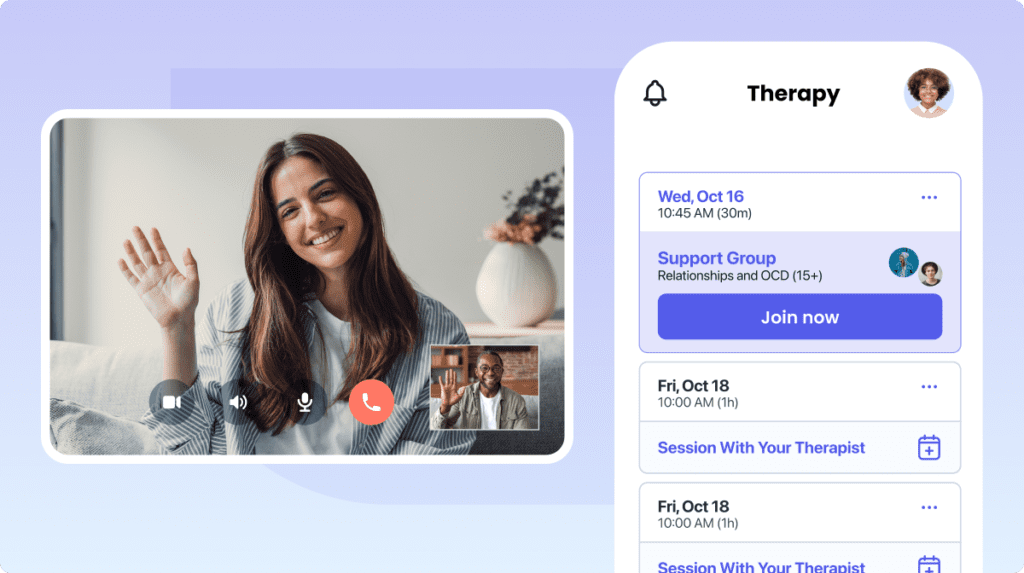I know first-hand how overwhelming and isolating obsessive-compulsive disorder (OCD) can be. Like many others, I spent a lot of time trying different therapies before finding real relief. While exposure and response prevention (ERP) therapy is the most evidence-based treatment for OCD, I realized people needed more than just therapy—they needed connection. That’s why we created the NOCD Community. Today, nearly a million Members have 24/7 web and app-based peer support, live groups, and digital tools that make recovery feel less lonely. NOCD isn’t just therapy—it’s a community built by people who truly understand what you’re going through.
How does NOCD support members?
There are a few ways you can get community support during your treatment journey at NOCD, including:
- Support groups: NOCD offers 20+ live support groups each week, covering topics from taboo obsessions to relapse prevention. There are also dedicated groups for loved ones supporting someone with OCD.
- Member Advocates: People who have lived with OCD and completed ERP through NOCD Therapy now serve as advocates, motivating and encouraging members throughout their recovery journey.
- NOCD Community: An open forum where both Members and non-Members can share their experiences, ask questions (without seeking reassurance), and support one another on the path to recovery.
When you’re going through ERP, it’s okay to feel a bit anxious or alone. Community support helps you stay motivated, reduces stigma, and reminds you that thousands of others are successfully doing the same work. Many Members say the community has been the key to sticking with treatment, especially during triggers or challenging exposures.
What makes NOCD Therapy different from other OCD treatment options?
NOCD delivers ERP therapy, the most effective treatment for OCD. Before working with Members, we have every therapist complete intensive, graduate-level training, ensuring they deliver compassionate and effective care. Many have said it’s the most rigorous preparation they’ve ever received—and that makes sense, since fewer than 1% of therapists are properly trained in ERP.
Studies show that ERP helps about 80% of people significantly reduce their OCD symptoms. By making ERP accessible online and pairing it with ongoing support, NOCD helps Members achieve real progress in their daily lives.
In addition to ERP, NOCD integrates complementary approaches when helpful, such as medication (in collaboration with prescribers), mindfulness-based strategies, and acceptance and commitment therapy (ACT). They are typically done in combination with ERP therapy.
We also recognize that ERP alone—or ERP combined with medication—may not be enough to break the OCD cycle. In those cases, we connect our Members with providers who offer higher levels of care for severe or treatment-resistant OCD, including:
- Intensive outpatient programs (IOPs)
- Partial hospital programs (PHPs)
- Residential treatment centers (RTCs)
- Transcranial magnetic stimulation (TMS)
- Deep brain stimulation (DBS)
- Gamma knife radiosurgery (GKRS)
What extra support do members get beyond therapy sessions?
With NOCD, treatment doesn’t stop when your session ends. Members can message their therapist between sessions, access a library of expert-backed educational resources, and utilize interactive tools to build ERP skills at home, tracking their progress through the NOCD app.
This between-session support is rare in traditional therapy, but it makes a big difference. Having your therapist and tools at your fingertips helps you practice ERP more consistently, leading to stronger results.
Why do people choose NOCD over traditional therapy?
People choose NOCD because it’s specialized, accessible, and supportive. Unlike general therapy, which may not address OCD directly, NOCD focuses solely on OCD and related conditions.
- Specialized: Every therapist is trained in ERP, the treatment proven to be the most effective for OCD.
- Accessible: NOCD is available by telehealth and covered by most insurance plans, including UnitedHealthcare, Aetna, Cigna, Blue Cross Blue Shield, and others. In fact, over 138 million Americans can access NOCD Therapy through their health insurance benefits.
- Supportive: Beyond therapy, members gain tools, community, and therapist messaging that make ERP sustainable.
In fact, a recent study found that most NOCD Members saw major improvements within about three months, with 71% meeting the criteria for significant symptom reduction.
Find the right OCD therapist for you
All our therapists are licensed and trained in exposure and response prevention therapy (ERP), the gold standard treatment for OCD.
How can I get started with NOCD?
Getting started with NOCD is simple. You can book a free 15-minute call to learn more, get answers to your questions, and be matched with one of 700+ licensed ERP therapists who understand what you’re going through and can guide you on the path to recovery.
From there, you’ll begin treatment quickly—often within days, not months. Most major insurance plans are accepted, and sessions are delivered entirely online, so help is always within reach.
Bottom line
NOCD Therapy isn’t your typical therapy. It’s effective ERP treatment plus continuous support, real connection, and a community of people who understand what you’re going through. With NOCD, you don’t have to face OCD alone—you’ll have the tools, guidance, and support to take your life back.
Key takeaways
- NOCD provides ERP, the most effective treatment for OCD, with therapists trained explicitly in OCD care.
- Members gain access to 20+ weekly support groups, community forums, and lived-experience advocates.
- Between-session therapist messaging and digital tools help members stay on track with ERP.
- Research shows 71% of NOCD Members experience significant symptom improvement within about 11 weeks.

